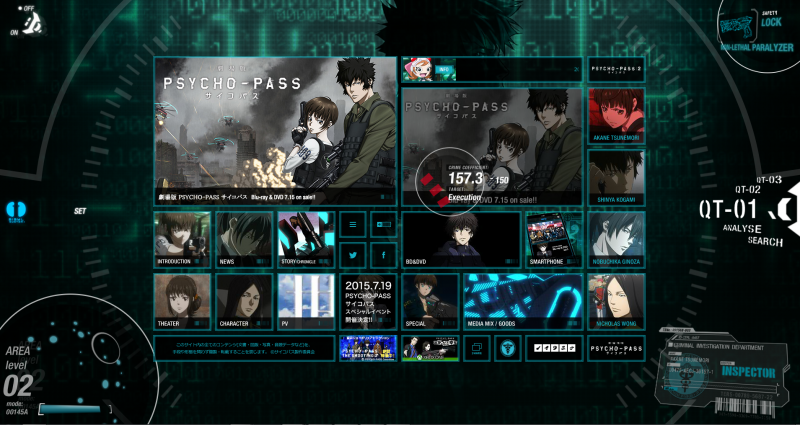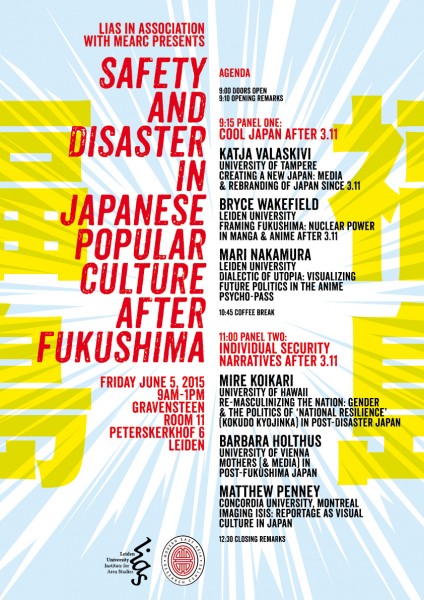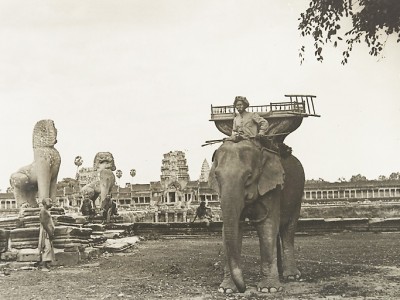
ウェブサイト「サイコ・パス」のスクリーンショット。 サイコ・パスは3・11大災害後に作られたデストピア・アニメ。.

June 5 workshop at Leiden University. Image courtesy Bryce Wakefield.
(訳注:記事内容は原文の掲載日2015年6月1日当時の状況を反映している。)
2015年6月5日(金)、ライデン大学(オランダ)の主催で、「東日本大震災後の日本の大衆文化における安全と災害」というテーマのもと1日ワークショップが開かれる。これは一般公開型のパネルディスカッションを中心としたものだ。
2011年3月11日、日本は「三重の災害」に見舞われた。巨大地震と破壊的津波。そしてその結果、第3の危機が福島原子力発電所を襲った。この一連の大惨事は時に「3・11」と呼ばれている。
グローバル・ボイスはブライス・ウェイクフィールド博士にインタビューを行った。博士は日本の政治と国際関係を専門とし、ライデン大学で講師を務めている。博士は6月5日にワークショップを開催し、当日、福島の大災害後のマンガと原子力発電について発表する。
ネビン・トンプソン(以下、NT): 3・11は日本にとっていかに重要な出来事だったのか。
Dr. Bryce Wakefield (BW): The earthquake, tsunami and nuclear accident seemed like game changers for Japanese society at the time. There was talk of ambitious projects to rebuild the communities damaged by these disasters, that the disasters might mark a new renaissance for Japan, that they would redefine the U.S.-Japan military alliance, and so on.
There were some immediate political and social effects after the disasters. Before the disaster U.S.-Japan relations had been damaged by a dispute over military basing issues in Okinawa, and bilateral rescue efforts immediately after the disaster changed the discussion in ways that enhanced the image of the alliance.
The Liberal Democratic Party (LDP), which had been in power almost continuously from 1955 until 2009, managed to exploit the disaster to show the weakness and inexperience of the new DPJ government, leading in part to LDP victory in 2012. Emphasis on specific issues—the value of volunteerism and civil disaster preparation, and the place of nuclear power in Japanese society—did become more prominent in national discussion.
However, a lot of the discussion about the disaster eventually became subsumed by existing narratives in Japan. Today Fukushima and disaster recovery are still important topics in the national discourse, but the wide-ranging shift in political and social perspectives that some were predicting did not come to pass as a result of the disaster.
ブライス・ウェイクフィールド博士(以下BW): 当時は、この地震と津波と原発事故が日本社会を根底から変えてしまうかと思われた。一連の災害による被災地再建の大々的な計画の話があった。この大災害は日本にとって新たなルネッサンスになるかもしれないとか、この大災害は日米軍事同盟の見直しにつながるだろうとか言われたのだ。
大震災後早くも何らかの政治的・社会的影響があった。それまでの日米関係は、沖縄の基地問題をめぐる議論で険悪な状態だった。しかし大震災直後、日米協同の迅速な救助活動が功を奏し、議論は同盟強化の方向で進められるようになった。
自由民主党は1955年から2009年までほぼ継続して政権を担当していたが、この震災に乗じて、当時の民主党政権の弱点と経験不足をなんとか暴露することに成功した。そのことも2012年の選挙での政権奪回につながったと言える。ボランティア活動の重要性、国民の災害準備、日本社会での原子力発電の役割など特定の問題にスポットを当てた。それが大きな要因となって、国民的議論でより多くの国民の支持を集めたのだ。
震災についてはいろいろと議論されてきたが、結局は日本で現在語られている体験談の一部になってしまった。現在でも福島や震災復興は国民的議論の重要な議題だが、大震災の結果として一部予測された広範囲の政治的・社会的変化は起こらなかった。
NT: 日本の大衆文化は福島の原発事故でどのように変わったのか。
BW: It depends what you mean by “popular culture.” As noted just now there was increased emphasis on volunteerism after the disaster. That could be an area of popular culture worth investigation.
One of the definitions of popular culture is that it concerns the practices of everyday life: how, for example, do people interact with the media. At our event, Barbara Holthus of the University of Vienna will be showing how parents concerned for their children’s health in the wake of Fukushima are coordinating their activities and using media, including social media, in new ways.
Similarly, Mire Koikari of the University of Hawaii will be looking at how notions of masculinity are asserted in popular attempts to make Japanese people more aware of the need for civil defense.
Another speaker, Katja Valaskivi of the University of Tampere, has written critically on the government’s attempts to incorporate notions of resilience into its post-Fukushima public diplomacy.
Popular culture is a wide ranging term, and as well as the usual images of anime and manga that people think of when they hear “Japanese popular culture,” we do need to examine popular phenomenon more broadly.
BW: 「大衆文化」という言葉がどんな意味で使われるかによるだろう。今まさに指摘したように、災害後にボランティア活動がより重要視されるようになった。これなどは大衆文化の一分野として調査する価値があるかもしれない。
1つには、大衆文化とは毎日をどう過ごすかということだと思う。例えばメディアとの関わり方だ。このワークショップでは、福島原発事故後に親たちが子どもの健康を第一に考えて、斬新な方法で、生活パターンを変えたりソーシャルメディアなどのメディアを利用したりしている様子をウィーン大学(オーストリア)のバーバラ・ホルトスが発表する予定だ。
また、ハワイ大学(米国)のミレ・コイカリは、日本国民に民間防衛の必要性をもっと知ってもらおうという大衆向けの取り組みに、男らしさという考えがいかに強く主張されているかを考察することになっている。
タンペレ大学(フィンランド)のカティア・ヴァラスキビも講演を行う。彼女は回復力(レジエンス)という概念を、大震災後の民間外交に取り入れようとする政府の試みについて批判的な記事を書いてきた。
大衆文化という言葉には幅広い意味がある。「日本の大衆文化」という言葉を耳にしたときに、皆さんが普通に思い浮かべるアニメやマンガだけでなく、人々の間で流行している現象をより広範に調査する必要が大いにあると思う。
NT: マンガやアニメは原発事故をどう取り扱っているか。
BW: Before the nuclear disaster, manga and anime were sometimes deployed in public relations efforts to support the notion that nuclear power was safe.
Although there are some post-Fukushima manga that have been labelled pro-nuclear “propaganda,” there have also been more critical voices. These critical voices, however, fit into major themes of the postwar period in manga and anime. Those themes stress the dark side of scientific progress stress the dark side of scientific progress.
Some darker works are also often pessimistic about power relationships in Japanese society and politics.
Mari Nakamura’s presentation looks at issues of surveillance within the recent anime, Psycho-Pass, for example. In the past couple of years there have also been a number of critical works emerging that evoke distrust in government narratives about nuclear power. Manga and anime have discussed critical themes in the past, and will continue to raise such themes in relation to Fukushima.
However, these are often presented in ways that stay away from difficult or challenging content, such as radiation sickness, out of respect for the survivors.
BW: 原発事故以前は、マンガやアニメは原子力発電の安全神話を支持するPR活動に使われることがあった。
福島原発事故後のマンガの中には、原子力を支持する「広告塔」というレッテルを貼られてしまったものがある反面、原発により強い批判の声を上げているものもある。しかし、このような原発批判はマンガやアニメの戦後の主流テーマにはふさわしいものだ。科学の発展が持つ暗黒面を強調するテーマだからだ。
なかには、日本の社会と政治の力関係を悲観的にとらえがちな、より陰気な作品もある。
ライデン大学のマリ・ナカムラの発表は、最近のアニメ(例えばサイコパス)に見られる監視社会の問題についての考察である。ここ数年、原子力発電に関しての政府談話に対して、視聴者に不信を抱かせる批判的な作品がかなり出現してきた。マンガやアニメは従来から批判的なテーマを論じてきたが、福島の原発事故に関してもそのようなテーマを提示し続けるだろう。
しかしその場合でも、災害の生存者の人権に配慮して、放射線病のような扱いが難しい内容には触れないように示されることが多いと言える。
NT: 2番目のパネルディスカッションは「安全保障問題」に焦点をあて、イスラム国と名乗る過激派組織(ISIS)問題が話題に取り上げられる。それは東日本大震災とどんな関係があるのか。
BW: In his presentation, Matthew Penney of Concordia University in Montreal will be talking about the relationship between public discourse and popular culture in Japan in the context of recent discussion about ISIS.
He is focused on the notion of political punditry as a type of popular culture performance, and the notion of pundits as characters that have been cultivated across media platforms.
These characters are seen to be “experts” on a wide range of issues, but because their intellectual net is cast so wide, it is questionable whether they can offer real analysis instead of emotional commentary on a number of these issues.
As such, pundits are often exploited by people with agendas on the extreme left and the right of politics, and this is very evident in the case of discussion about ISIS. So what are the media dynamics involved that make these pundits voices of authority?
As I think Matthew will outline in his talk, there is also an obvious connection there to the Fukushima accident and the punditry that ensued thereafter.
BW : コンコルディア大学(カナダ)のマシュー・ペニーは、日本の世論と大衆文化との関係を、ISIS問題に関する最近の論調に沿って論じることになるだろう。
マシューは2つの概念にスポットを当てている。まず、政治評論をすることは一種の大衆文化パフォーマンスだということ、そして学者先生方はメディアの世界を通して育まれてきたキャラクターだということだ。
この先生方は広範囲にわたる問題について「専門家」と言われているが、情報のアンテナの範囲があまりに広すぎるので、多くの問題について、感情的な解説ではなく本当の意味での分析ができるかどうかは疑わしいと思う。
専門家先生方は政治的極左や右派の論者にそれなりによく利用されている。ISISについての議論を見ればよく分かるだろう。こんな先生方の意見を権威あるものとするなんて、メディアの力とは一体何なんだ。
マシューが話の中で概要を述べてくれると思う。そこでは安全保障の話が、福島の原発事故や事故後現れた専門家先生方と明らかに関係があることが分かるだろう。
NT:ライデン大学と日本の関係について少し話してほしい。
BW: The Netherlands does, of course, has a significant historical relationship with Japan, with the Dutch holding exclusive rights to trade with Japan during the Edo Period. Today, Leiden is a sister city with Nagasaki, where this trade took place.
Leiden University was the first university outside of Asia to establish a chair of Japan Studies, in 1855. Today, in terms of first year student enrollment numbers, Japan Studies is one of the largest programs in the university’s very strong Faculty of Humanities.
We have been sending our students at Nagasaki University since the 1980's. Every year 10 to 12 top students go there for five months. Every student enrolled in the bachelor’s program has the chance to go to Japan for as part of their degree. It really is a great program.
BW:オランダと日本にはもちろん重要な歴史的関係がある。江戸時代にはオランダ人は日本との通商権を独占していた。現在、ライデン市は長崎市と姉妹都市関係にあるが、長崎市はこの通商が行われた場所なのだ。
ライデン大学は、1855年にアジア以外で初めて日本学科を設立した大学だ。現在、1年生の入学者数から言えば、日本学はこの大学の豊富な学科数を誇る人文学部の中でも最多生徒数を有するプログラムの1つだ。
本学は1980年代から長崎大学に学生を送り続けている。毎年10人から12人の最優秀学生が5ヶ月間派遣される。学士課程に入学した学生には皆、その学位獲得の一環として日本へ行くチャンスがある。これは本当に素晴らしいプログラムだ。
「東日本大震災後の日本の大衆文化における安全と災害」はオランダのライデン大学で開催される。このワークショップへの参加に関心がある方はここから登録を。
校正:Maki Ikawa






